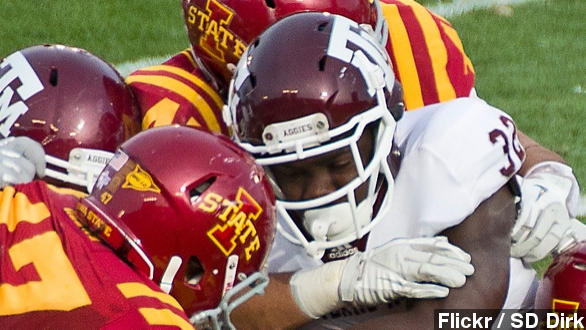A few changes are coming to college football. Among them: not getting a 15-yard penalty when that penalty turns out not to be penalty. Makes sense, right?
Targeting fouls were much debated last year. The rule states that when a defensive player "targets" and hits the head of an offensive player, that defensive player will be ejected and the team receives a 15-yard-penalty. Officials then review the hit to confirm the defensive player aimed at the head. (Via Flickr / SD Dirk, John Martinez Pavliga)
And that's where the rule got a bad rap.
After the video replay, if officials concluded the initial call wasn't a targeting penalty — basically, if they got the call wrong — the defensive player would be able to stay in the game, but the team would still be assessed a 15-yard penalty. (Via The New York Times)
Now the second part of that rule is no more.
The NCAA's Playing Rules Oversight Panel voted to do away with that 15-yard infraction if the play wasn't actually a targeting foul.
"Again, I don't know one coach, certainly not any fan, that were in favor of this rule. But at least the NCAA oversight committee was smart enough to reverse this thing after one year." (Via ESPN)
And a writer for Bleacher Report agrees, saying: "The NCAA got it right this time. That should be pointed out."
Aside from the targeting change, the committee also voted to table the proposed 10-second runoff rule, meaning offenses would have needed to wait at least 10 seconds before snapping the ball, giving the defense time to sub. That rule could be revisited next season. (Via Sports Illustrated)
And for the many fans already milling about, the NCAA college football season starts Aug. 23 with Sam Houston State at Eastern Washington. Don't worry. It'll be here before you know it. (Via USA Today)


